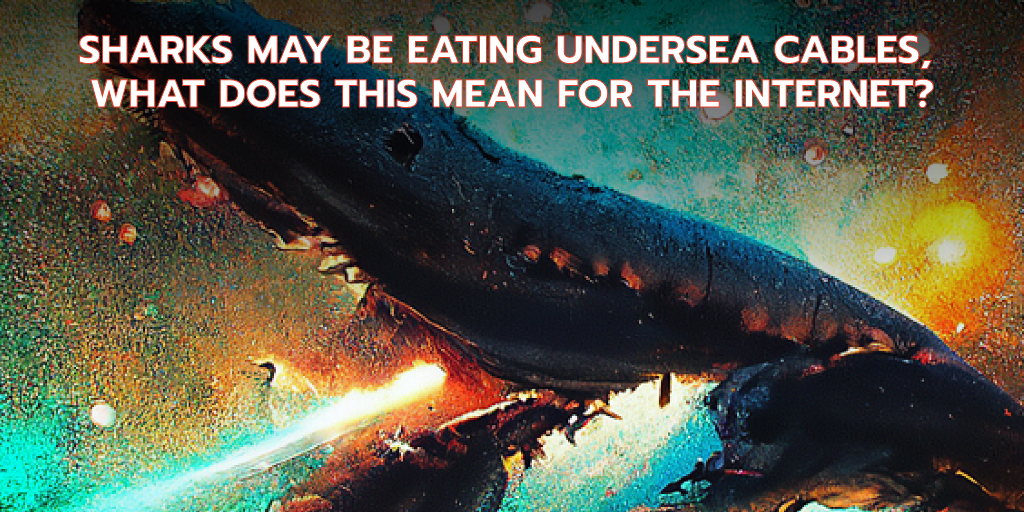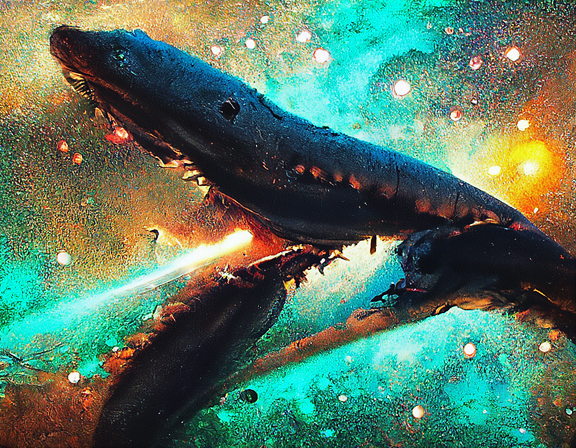
Sharks May Be Eating Undersea Cables, What Does This Mean for the Internet?
Hello Friends,
Last night I was doing a podcast talk with the most epic @thelogicaldude. About midway through this talk, the data stream got interrupted. Who knows what the true cause of this interruption was, but I blamed the sharks, why? Well, sharks do eat cables. So today, let's talk about this a bit.
It is a fact that the Internet is made up of a bunch of interconnected cables. These cables essentially allow computers, smartphones and other devices to connect to one another and share information. Because of this, the undersea cables are a key part of how the Internet functions. However, it appears as though sharks are starting to eat these cables. This means that it’s possible that the undersea cables could be damaged, which could disrupt the Internet. As a result, we’ll take a look at what this really means and why the Internet could be in danger.
What is an Undersea Cable?
An undersea cable, also known as an undersea transmission line, is a cable that’s connected to the ocean floor. The cable is connected to a land-based facility that allows the cable to transmit data. Submarine cables are critical to the modern world. They allow the transfer of data, including telecommunication services, financial data, Internet traffic, and more. There are an estimated 17,000 miles of these cables connecting more than 120 countries. These cables are located in many parts of the world, including in Asia, North America, and Europe. They are also located in the Pacific Ocean, Indian Ocean, and the Atlantic Ocean. It’s important to keep in mind that these cables are located on land and sea, so they can be cut by any nearby country.
Why Should We Care About Undersea Cables?
Undersea cables are the backbone of the internet. They’re responsible (*at least for now) for 99% of international data traffic, and they’re vital for our economy, for our security, and for our way of life. But they’re also under threat. From ship anchor damage to shark bites, there are a lot of ways for undersea cables to be damaged or destroyed. And when they are, it can have major consequences. That’s why we should all care about undersea cables. We rely on them for so much, and their protection is essential for our future.
Replacing or upgrading these cables is very expensive and would be inconvenient for everyone involved. Submarine cables are also located in a dangerous place to be. The oceans are prone to weather changes, including hurricanes and tsunamis.
Why do Sharks Eat Undersea Cables?
It’s important to note that sharks aren’t really 'eating' the cables. A popular theory is that sharks are attracted to the cables because they have an electromagnetic field around them. However, people who study this agree that there is no one official reason as to why.
Perhaps it can be that cables are often made of iron, which is a very important mineral for many species. It’s possible that sharks eat the cables because they are hungry or just curious and don’t know any better, or even it could be that sharks are just jerks and like to mess with us humans.
This is a great article that talks more about this topic : https://www.wired.com/2014/08/shark-cable/
Can Starlink be the solution to this issue?
Starlink is a project that is aimed at using satellites to provide Internet coverage. The project is still in the very early stages of development, but it could still be a solution to this issue.
The satellites would beam down Internet signals to devices on the ground. This would allow devices like smartphones, tablets, computers, and routers to connect to the Internet and bypass sea cables. It’s important to note that Starlink is just one of several projects that are designed to use satellites to provide Internet coverage. There are many others as well.
What makes Starlink stand out is that it’s designed to connect devices in the field. It’s designed to use satellites as the link between devices, not just Internet access.
Perhaps it is not sharks, but an advanced underwater civilization to blame?
I would not be doing justice to this topic if we did not talk about other more far out concepts...
The undersea world is a vast and largely unexplored place. For centuries, humans have used the oceans for transportation and trade, but there is another world beneath the waves that is largely unknown. Some believe that there is an advanced underwater civilization that is destroying undersea cables. While there is no scientific evidence to support this claim, it is an interesting theory that warrants further exploration (*Perhaps another post later on).
Conclusion
The internet is not just a web of interconnected computers. It’s a web of interconnected people. And, as we become more and more reliant on the internet for our daily lives, the question of its stability and security becomes more important. So, while the news that sharks may be eating undersea cables is both silly and alarming, it’s also a reminder that we need to be vigilant about the infrastructure that we depend on.
- What are your thoughts on Sharks and Data Cables?
Thanks for reading!
Like the Cover Art? If so, Buy the NFT of it!!

Price : 25 HIVE
Link : https://nftshowroom.com/jacuzzi/collection/jacuzzi_digital-painting_shark-eats-data-cable-in-space


| Travel Photos: | @RoamingSparrow |
| Photo Repository: | Roamingsparrow.SmugMug.com |

Services I Use and Recommend:
 |  |
|---|---|
 |  |
 |  |
 |
Help Support Ongoing Content
| Bitcoin (BTC) | 18zopjg9Y2VA1ouCqCZapN3UzdpK3UnMdm |
| Ethereum (ETH) | 0x34F6e26d9730b934Af026A7de727fb8fC08204Dd |
| Binance Smart Chain (BSC) | 0x34F6e26d9730b934Af026A7de727fb8fC08204Dd |

Thank you for your support!
Posted Using LeoFinance Beta





